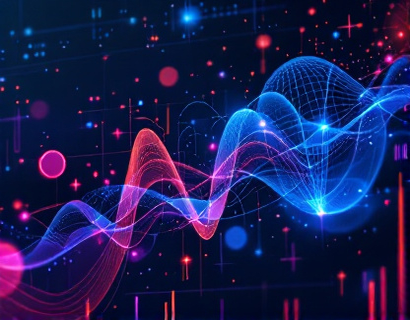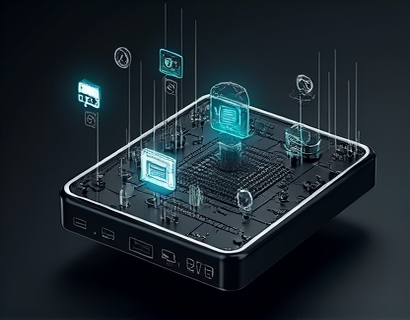AI-Powered Healthcare: Revolutionizing Access to Personalized Medical Insights and Expert Advice Online
In the rapidly evolving landscape of healthcare, the integration of artificial intelligence (AI) is transforming the way individuals access and receive medical insights and expert advice. This shift towards AI-driven healthcare solutions is not just a trend but a pivotal transformation that promises to enhance patient outcomes, streamline healthcare delivery, and empower individuals to take control of their health like never before. At the core of this revolution is the development of advanced platforms that leverage AI to provide instant, personalized medical insights and expert advice, making high-quality healthcare more accessible than ever.
The Need for Personalized Healthcare
Traditional healthcare models often struggle to provide personalized care due to the sheer volume of patients and the complexity of individual health needs. Each person's genetic makeup, lifestyle, and environmental factors contribute uniquely to their health, making one-size-fits-all approaches less effective. AI-powered healthcare platforms address this gap by analyzing vast amounts of data to offer tailored recommendations and insights. These platforms use machine learning algorithms to understand individual health patterns, predict potential issues, and suggest appropriate actions, thereby bridging the gap between generic medical advice and personalized care.
Instant Access to Personalized Medical Insights
One of the most significant advantages of AI-powered healthcare is the ability to provide instant access to personalized medical insights. Gone are the days when patients had to wait for appointments or sift through countless resources to understand their health. With these advanced platforms, users can receive immediate responses to their health queries, whether it's interpreting symptoms, understanding test results, or getting advice on managing a chronic condition. This instant access not only reduces anxiety and uncertainty but also enables users to make timely decisions about their health.
How AI Analyzes Health Data
The process begins with users inputting their symptoms, medical history, and other relevant information into the platform. AI algorithms then analyze this data, cross-referencing it with extensive medical databases, research papers, and real-time health information. The system considers various factors, including the user's age, gender, lifestyle, and genetic predispositions, to generate a comprehensive and accurate assessment. This analysis is not static; it continuously learns and adapts based on new data and feedback, ensuring that the insights provided remain relevant and up-to-date.
Expert Advice at Your Fingertips
While instant insights are valuable, the expertise of medical professionals remains irreplaceable. AI-powered healthcare platforms bridge the gap by connecting users with qualified healthcare experts who can provide in-depth advice and guidance. These experts, ranging from primary care physicians to specialists, offer personalized consultations based on the insights generated by the AI system. This combination of AI-driven analysis and human expertise ensures that users receive comprehensive and reliable advice, enhancing the overall quality of care.
Benefits of Expert AI-Assisted Consultations
The integration of AI and expert consultations offers several benefits. Firstly, it democratizes access to expert care, making it possible for individuals in remote or underserved areas to receive high-quality medical advice. Secondly, it reduces the burden on healthcare systems by providing initial assessments and recommendations through AI, allowing doctors to focus on more complex cases. Lastly, the continuous learning capability of AI ensures that the advice provided is based on the latest medical knowledge and research, keeping users informed and empowered.
Enhanced Well-Being Through Timely Support
The immediate and personalized nature of AI-powered healthcare platforms contributes significantly to enhanced well-being. By providing timely support and guidance, these platforms help users manage their health proactively. For instance, individuals with chronic conditions can receive real-time monitoring and alerts, enabling them to adjust their treatment plans as needed. This proactive approach not only improves health outcomes but also reduces the likelihood of hospitalizations and emergency visits, leading to better overall well-being.
Mental Health and AI
Mental health is another critical area where AI-powered healthcare is making a substantial impact. Mental health issues often require ongoing support and monitoring, and AI platforms can offer continuous check-ins, mood tracking, and personalized coping strategies. By leveraging natural language processing and machine learning, these platforms can detect early signs of mental health deterioration and recommend appropriate interventions, whether through self-help resources or professional consultations.
Transformative Impact on Healthcare Delivery
The integration of AI in healthcare is not just about providing individual benefits; it is fundamentally transforming the healthcare delivery system. By automating routine tasks and providing data-driven insights, AI reduces administrative burdens, allowing healthcare professionals to focus more on patient care. This shift leads to more efficient healthcare delivery, reduced costs, and improved patient satisfaction. Moreover, AI can help identify trends and patterns in large datasets, aiding in public health surveillance and the prevention of disease outbreaks.
Challenges and Considerations
Despite the numerous benefits, the adoption of AI in healthcare is not without challenges. Ensuring data privacy and security is paramount, as sensitive health information must be protected from breaches and misuse. Additionally, there is a need for robust regulatory frameworks to govern the use of AI in healthcare, ensuring that the technology is safe, effective, and equitable. Addressing these challenges requires collaboration between technologists, healthcare providers, policymakers, and patients to create a trusted and reliable AI-driven healthcare ecosystem.
Empowering Patients Through Education and Engagement
A key aspect of AI-powered healthcare is the empowerment of patients through education and engagement. By providing accessible and understandable health information, these platforms enable users to make informed decisions about their care. Interactive tools, educational resources, and personalized feedback help patients understand their conditions, treatment options, and lifestyle changes that can improve their health. This level of engagement not only enhances patient satisfaction but also fosters a more collaborative relationship between patients and healthcare providers.
Patient-Centric Design
To truly empower patients, AI-powered healthcare platforms must be designed with the user in mind. This means creating intuitive interfaces, offering multilingual support, and ensuring accessibility for individuals with disabilities. By prioritizing user experience, these platforms can overcome barriers to healthcare access and ensure that the benefits of AI are available to a diverse population.
The Future of AI in Healthcare
As AI technology continues to advance, the potential applications in healthcare are vast and exciting. From precision medicine to predictive analytics, the future holds the promise of even more personalized and effective care. However, realizing this potential requires ongoing innovation, investment, and a commitment to ethical standards. The collaboration between AI experts, healthcare professionals, and patients will be crucial in shaping a future where AI-driven healthcare enhances the quality of life for individuals around the world.
In conclusion, AI-powered healthcare is not just a technological advancement; it is a transformative force that is redefining the landscape of healthcare delivery. By providing instant access to personalized medical insights and expert advice, these platforms are empowering individuals to take control of their health, leading to improved well-being and more efficient healthcare systems. As we move forward, the continued development and responsible implementation of AI in healthcare will be essential in creating a healthier, more informed, and more connected world.










































